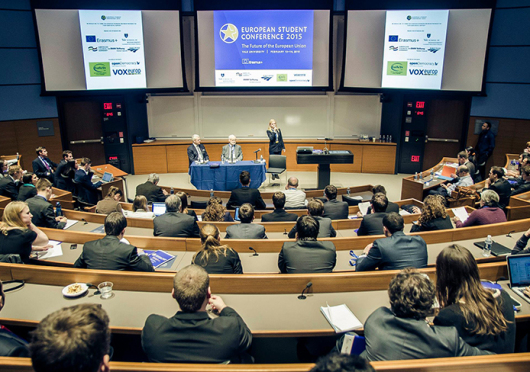
The first plenary of the European Student Conference is conducted at the Yale School of Management on Feb. 14.
Credit: Courtesy of European Student Conference / Philipp Arndt
Because I grew up in Europe, living in the United States is not a big deal for me.
Social norms are similar, and food tastes fairly alike. Politically, the European Union and the United States are steady allies and partners, facing the same problems and sharing the same values.
But I feel that my home, Europe, gets less attention in the U.S. than it deserves.
This is why 80 students from across the U.S. and one European college gathered at Yale University on Friday and Saturday for the first European Student Conference, where they met European policymakers and scholars to discuss specific policy proposals for the European Union.
David O’Sullivan, EU ambassador to the U.S., and former head of the World Trade Organization Pascal Lamy were among those in attendance. Former Prime Minister of the United Kingdom Tony Blair and Ulrike Lunacek, vice president of the European Parliament, sent video messages with greetings and ideas.
“For years, students at American universities have lost interest in the future of the EU,” said Melina Sanchez Montanes, a student at Yale who is from Spain and vice president of the conference.
Unfortunately, preoccupied by the rise of China and the Asian tigers, caring about Europe in the U.S. does not seem fashionable anymore. But the trans-Atlantic relationship cannot be neglected by either side, especially our next generation of leaders.
Through the Transatlantic Trade and Investment Partnership, which is a trade and investment deal between the EU and the U.S. that’s currently being negotiated, the EU and the U.S. might soon form the largest free-trade area known to man — and our generation will feel the most impact of these policies, as the TTIP will set rules for generations.
But it’s not only the TTIP that U.S. students should care about. The conference drafted policy proposals on subjects such as an innovative economy in Europe, migration in the Mediterranean, democratic participation and creating European solidarity. All proposals will be submitted to the European Union.
Even if military and economic perspectives shift, cooperation and mutual understanding between these two world powers will be crucial. I am convinced that the relationship between our two continents will still be shaping world affairs for decades to come.
This is why the conference founded the student-led think tank European Horizons, which aims at fostering the discourse on European policy in U.S. universities. Everyone with a genuine interest in the EU and trans-Atlantic relations is welcome — with or without knowledge of Europe and its institutions.
Students who attended the conference will establish chapters of the think tank, strongly connected to the headquarters of the think tank at Yale, on their campuses — and there is a plan to found one at Ohio State. (If you’re interested, do not hesitate to contact me.)
The U.S. and Europe share an important history and they share a future as well. This is why U.S. students should care more, engage more and be more curious about what is happening on the old continent.
Learn French, German or another European language! Travel to Europe for more than a 10-day tour of the continent’s capitals! Read and understand news coming from London, Paris, Berlin and Rome! Study the European legal and political system and contribute your visions and ideas to the European Horizons think tank to establish a long-term discourse on European politics and policy in the U.S.
European Horizons is a network of young future leaders all across the U.S. interested in a common subject. It will host speaker events and be a place for young Americans to voice their opinions on the EU through policy proposals and opinion pieces published by the national think tank and in news outlets.
Perhaps your thoughts and ideas from your safe — and potentially productive — distance will make an important difference in Europe, and, in the end, benefit us all on both sides of the Atlantic.


